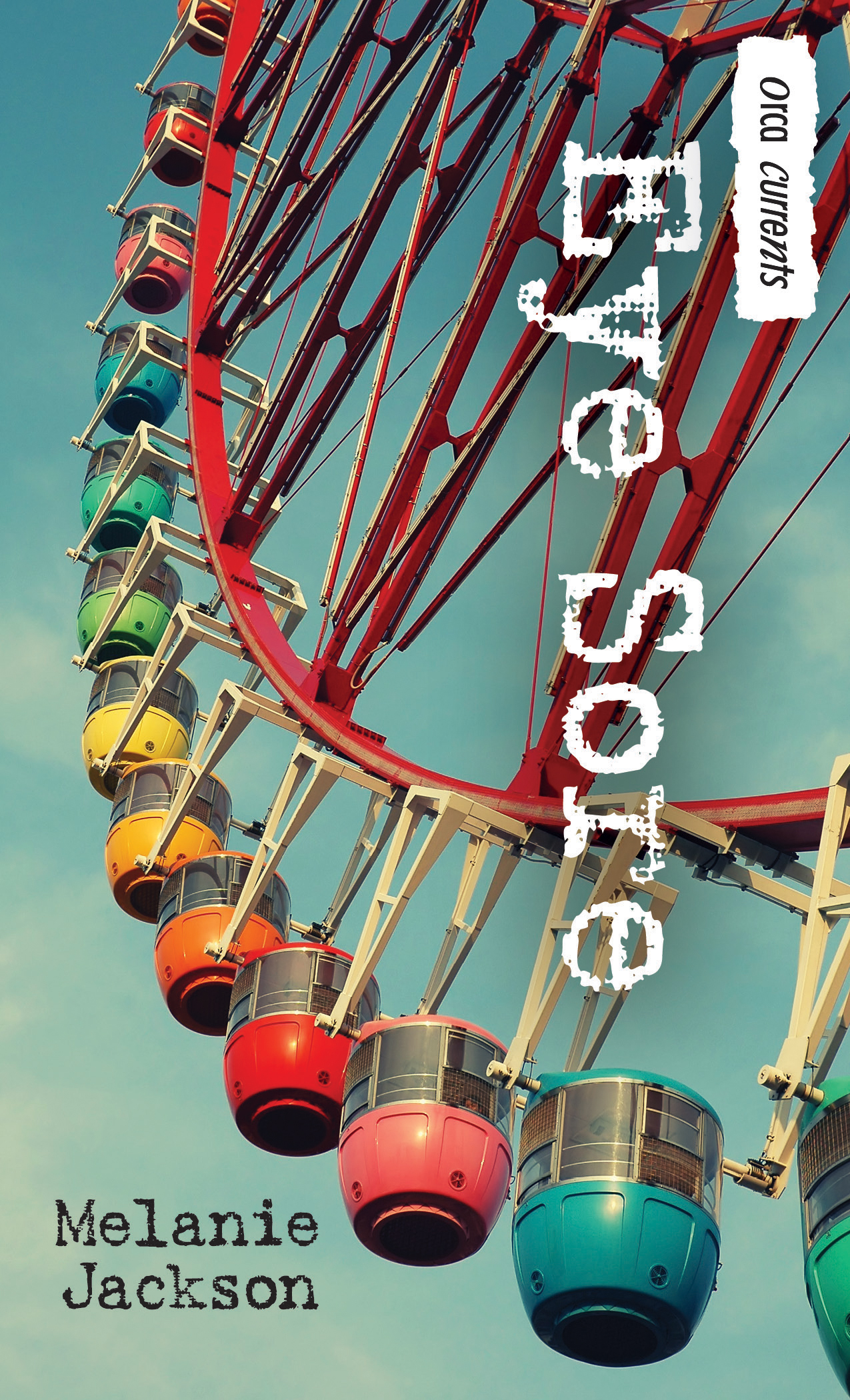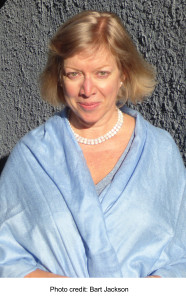#TuesdayTalk with Melanie Jackson. Melanie’s most recent Orca Currents novel, Eye Sore, launched this May.
When did you decide to become a writer?
From the word go. My mother read to me, and I got into stories at an early age. I remember being so angry with Cinderella’s ugly stepsisters that I swatted the page they were pictured on. Stories were everything to me. Here’s a shout-out thank you to the CBC for inspiring me in another way. When I was young, they had a TV show called Time for Adventure. It always began with a girl bicycling to an old house in the woods. She went inside, got her journal out of a hiding place, and started to write. The scene then changed to an hour-long BBC kids’ adventure film. But it’s the opening I always remember. Even better, the tune she bicycled to was Dave Brubeck’s Take Five. How cool is that? I think what made the opening so appealing was the idea of writing being something personal and private; an escape.
Where do you get your story ideas from?
For me, story grows from setting. For my first novel, Spy in the Alley, I saw a blackberry-choked alley out the window and imagined a spy lurking there. Most recently, for Eye Sore, it was the London Eye. I wondered: What if North Vancouver had its own Eye, surrounded by forest instead of bustling city and Thames? What sorts of conflicts and secrets might that prompt? Years ago, my Shakespeare prof insisted that setting was everything. He was kind of a maverick, as the accepted scholarly line at the time was that everything depended on the main character’s tragic flaw. I didn’t pay much attention either way. But in crafting my stories since then, I’ve decided he was right.
What’s your writing ritual?
First thing in the morning, at my desk by my attic window, with coffee, and looking out at the trees, rooftops, mountains in the distance. Oh, and at the same alley, though the blackberries are gone—mowed down with an industrial plow by a very determined neighbor!
What do you look for in a good story?
Conflict. It’s the lifeblood of a story. If the protagonist has something or someone threatening them from the start, I’m gripped. I’m worrying about them, wondering how they’ll resolve it. Here’s what I tell kids on school visits: Ideally there’s a main conflict and a secondary one. I recently finished reading the suspenser Elizabeth is Missing, by Emma Healey. The protagonist’s main conflict is with the person(s) unknown who made her friend Elizabeth (and, 70 years ago, her sister) disappear. The protagonist’s secondary conflict is with… her dementia! She keeps forgetting what she’s found out. And, her memory keeps getting worse. Reminds me a bit of the film Memento, but totally stands on its own in brilliance and originality.
Have you had an odd job in the past? What was it?
When I was an undergrad at the U of Toronto, I had a summer job as a hostess on the top floor of the 57-story, 784-feet-high CIBC main office building, Commerce Court. For a fee, people could walk around, press their noses against the glass, and look way down to all the business types shuffling up and down Bay Street. It was a nice job, with many lulls where I got reading done. I had to wear a uniform: a burgundy dress with a pink neck scarf. The advantage was that I never had to worry about what to wear each day. Another feature of the top floor was an aviary. Canaries, budgies, etc. flew around in a protected area. One day the woman who looked after them forgot to shut the door. What a flap! All the birds charged out and zoomed around, swooping and diving. I had to try to help catch them. Only I didn’t try very hard. They looked so pretty flying around, and I thought they deserved a day out, as it were. It was also funny to watch the visitors, mostly tourists, ducking and holding purses or newspapers over their head in case—well, in case. Faced with competition from the much-higher CN Tower, CIBC shut down the 57th floor. The next summer they sent me to work in the mortgage department on the 10th floor. Everyone sat hunched over stacks of files and wore very serious expressions indeed. A comedown in more ways than one!
What one place in the world are you dying to go?
I want to go stand under the Boscobel oak, in Shropshire, England. In 1651, on the run from Cromwell and his grim Roundheads, Charles II climbed the oak and hid. The Roundhead soldiers had just beheaded his dad, Charles I, and were itching to lighten Charles II’s neck as well. The soldiers knew the young king must be nearby, as he’d just lost the Battle of Worcester. They rode right under the oak—but never looked up. Charles escaped to France. He returned in 1660 and instantly countermanded the Puritanical laws Cromwell, now dead, had put into place, including a ban on music and theater! Charles II is without doubt my favorite king. What particularly endears me to him is that he was easygoing and found life generally very amusing. In fact, when the soldiers were riding close to the oak, our boy had a nice nap on his branch! How could you not like someone so relaxed? The oak that stands by Boscobel House isn’t the same oak Charles hid in. But it’s a descendant.
Do you have any guilty pleasures when it comes to books?
I still go back and read Agatha Christies, even when I remember the whodunit. I devoured them when I was in my early teens, and her diabolical brain still intrigues. I shouldn’t really be ashamed of this, I suppose. But when someone approaches, staggering self-righteously under the weight of the latest Ondaatje or Drabble, and asks me what I’m reading, I don’t always have the nerve to admit I’m re-ripping through Murder on the Orient Express.
Favourite board game: go!
It’s a cellphone board game: Theseus. An oldie, but if you’re into puzzles and mazes, extremely satisfying.
What advice would you give an aspiring author?
Two things. Read a lot. The more you read, the better you write. And, have a day job! Most writers don’t make enough to live on. Hold down a job, and then you won’t have that horrid worry about unpaid bills hanging over you. And, since being a writer is a solitary endeavor, a job gets you out meeting people, making friends—and giving you ideas for stories. (Or, ahem, blog entries: See above.)
—
Scottish-born and mystery-minded, Melanie Jackson is the author of Orca’s Dinah Galloway Mystery Series for eight-to-11-year-olds, and young-adult suspensers such as The Big Dip and High Wire. Melanie, who lives in Vancouver with her family, is a business/advertising writer and editor—a Mad Woman! A book reviewer for the Vancouver Sun, she is also a member of the Sun’s Book Club. Melanie volunteers as a writing mentor with the Vancouver School Board.
Melanie welcomes opportunities for author visits to schools. For more information, e-mail Melanie or visit her blog.


